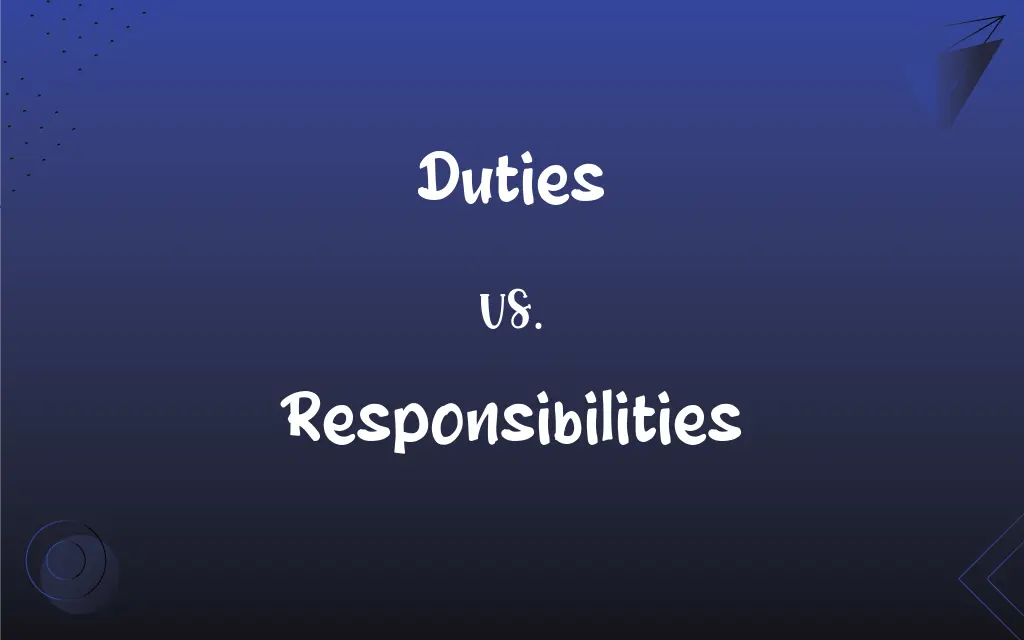Duties vs. Responsibilities: What's the Difference?
Edited by Aimie Carlson || By Harlon Moss || Updated on October 13, 2023
Duties are specific tasks required to be done as part of a role, while responsibilities are the overall accountability or ownership one holds in a scenario or position.

Key Differences
Duties typically refer to particular tasks or jobs that individuals are obligated to perform as part of their roles. The word “duties” implies specific, actionable items or activities that are typically assigned by a superior or stipulated by a role’s guidelines. Duties are the defined actions or tasks that arise from a person’s position or occupation. In contrast, responsibilities encompass a broader range. Responsibilities might involve managing others, overseeing projects, ensuring outcomes, or maintaining particular conditions. It implies a state of being responsible – answerable, accountable, and reliable concerning some other person or for some action or thing.
In another lens, duties often signify actions that are expected due to social, legal, or moral reasons. A duty might not provide any direct benefit to the individual performing it but serves to uphold a system or societal structure. Responsibilities tend to carry a sense of ownership and personal stake, entailing both actions and decision-making capabilities. They imply a moral, legal, or mental accountability and can span across various spheres of an individual’s life, work, or social interactions.
In a working environment, duties might encompass specific tasks such as filing documents, attending meetings, or creating reports. These are often outlined in a job description, providing clarity and direction to the role-holder. Responsibilities in a work scenario might include the overall management of a project, ensuring the team collaborates effectively, or securing client satisfaction. Responsibilities could be seen as the larger "umbrella" under which various duties are categorized.
Viewing it through a legal perspective, duties might be regarded as obligations that are enforceable under the law. For instance, paying taxes, abiding by regulatory guidelines, or adhering to specific codes and practices fall under legal duties. Responsibilities in a legal context might relate to the adherence to ethical practices, ensuring due diligence, or maintaining a standard of care in professional practices, which might not always be bound by strict legal frameworks but still hold substantial significance in professional and social contexts.
To provide a simplified metaphor: if being a team leader is a responsibility, then scheduling team meetings, assigning tasks, and ensuring project delivery on time might be seen as duties. Responsibilities often house various duties, guiding their execution and ensuring their completion adheres to a set standard or expectation.
ADVERTISEMENT
Comparison Chart
Definition
Specific tasks or activities
Overall accountability
Scope
Narrow, task-oriented
Broad, outcome-oriented
Ownership
Might not imply ownership
Implies ownership
Legal Context
Often legally bound
May or may not be legally bound
Involvement
More operational
Can be strategic and operational
ADVERTISEMENT
Duties and Responsibilities Definitions
Duties
Duties often imply a set of actions or behaviors expected due to one’s profession, role, or societal position.
The police officer carries out duties like patrolling areas and enforcing laws.
Responsibilities
Responsibilities refer to the overall accountability one holds in specific scenarios or positions.
His responsibilities in the project included oversight, coordination, and final delivery.
Duties
Duties are specific, outlined tasks that an individual is obligated to perform as part of their role or position.
His duties included filing paperwork, answering calls, and maintaining the schedule.
Responsibilities
Responsibilities imply a moral or ethical obligation to carry out tasks or duties reliably and effectively.
One of the teacher’s main responsibilities is to facilitate a safe and conducive learning environment for students.
Duties
Duties can represent import taxes or levies imposed on goods and services.
The duties imposed on imported goods aim to protect domestic industries.
Responsibilities
Responsibilities can denote a state or fact of having a duty to deal with something or of having control over someone.
As a mother, she holds responsibilities towards her children’s well-being and development.
Duties
Duties can also refer to moral or legal obligations that one should adhere to in societal contexts.
Citizens have duties such as paying taxes and serving on juries when called upon.
Responsibilities
Responsibilities often entail a sphere or area in which one has duties or the power to make decisions and take actions.
The manager has different responsibilities, including team development and project execution.
Duties
Duties may encompass specific actions or tasks undertaken to uphold or comply with a principle or regulation.
It is the duties of the trustees to manage the assets for the beneficiaries’ benefit.
Responsibilities
Responsibilities can signify the state of being the primary cause of something and so able to be blamed or credited for it.
The company took responsibilities for the mishap and assured corrective actions.
Duties
An act or a course of action that is required of one by position, social custom, law, or religion
The duties of being a critical care nurse.
Responsibilities
The state, quality, or fact of being responsible.
Duties
Required action or service
Jury duty.
Beyond the call of duty.
Responsibilities
A duty or obligation that one is responsible for.
Responsibilities
An expense, debt, or financial burden that one must pay.
Responsibilities
The amount of such expense, debt, or financial burden.
Responsibilities
Plural of responsibility
FAQs
What is a duty?
A duty refers to specific tasks or activities that an individual is obligated to perform.
Are duties legally binding?
Duties can be legally binding when they are mandated by law or a contractual agreement.
How do responsibilities differ from duties?
Responsibilities imply overall accountability, while duties refer to specific, actionable tasks.
Can responsibilities change?
Yes, responsibilities can change based on the role, context, and specific situations.
Who assigns duties?
Duties are typically assigned by superiors, or derived from legal, social, or moral obligations.
Can duties be delegated?
Duties can often be delegated, unless legally or morally bound to a specific individual.
Can responsibilities be shared?
Responsibilities can be shared among individuals or entities, depending on the context.
How do responsibilities affect performance?
Responsibilities often influence an individual’s or entity’s actions, decisions, and performance outcomes.
Can a duty be a responsibility?
A duty can be part of responsibilities, as the latter may encompass several specific duties.
What is a moral duty?
A moral duty is an obligation derived from ethical beliefs or societal moral guidelines.
Can one deny responsibilities?
Responsibilities can sometimes be denied or delegated, depending on the context and rules.
Who is accountable for responsibilities?
The individual or entity assigned with responsibilities is typically accountable for them.
Are all duties responsibilities?
While all duties can be seen as responsibilities, not all responsibilities are specific duties.
Can one have responsibilities without authority?
One can have responsibilities without authority, although it may hinder the effective fulfillment of those responsibilities.
Are responsibilities always formal?
Responsibilities can be both formal (documented) and informal (understood or assumed).
Can responsibilities be chosen?
Sometimes responsibilities are chosen, while at other times they are assigned or inherent to a role.
How are duties identified?
Duties are identified based on legal obligations, role requirements, or societal expectations.
Are responsibilities the same in all cultures?
No, responsibilities can be perceived and assigned differently across cultures.
Are duties always explicit?
Duties can be explicit (clearly stated) or implicit (understood), depending on the scenario.
What happens if duties are not performed?
Failing to perform duties might result in legal consequences, penalties, or other repercussions.
About Author
Written by
Harlon MossHarlon is a seasoned quality moderator and accomplished content writer for Difference Wiki. An alumnus of the prestigious University of California, he earned his degree in Computer Science. Leveraging his academic background, Harlon brings a meticulous and informed perspective to his work, ensuring content accuracy and excellence.
Edited by
Aimie CarlsonAimie Carlson, holding a master's degree in English literature, is a fervent English language enthusiast. She lends her writing talents to Difference Wiki, a prominent website that specializes in comparisons, offering readers insightful analyses that both captivate and inform.































































